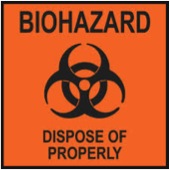News and Notes from The Johnson Center
How to Safely Dispose of Medications
JCCHD | Wed, November 26, 2014 | [Healthcare][Q and A ]Unused and expired medications cause health hazards. Leaving medications in a cabinet makes them readily accessible to children and teenagers, creating a risk for accidental consumption and/or drug abuse. Flushing medication down the toilet contaminates drinking water; traces of numerous pharmaceuticals have already been found. This raises concerns for both human health and the environment. Therefore, proper management and disposal of medications is a necessary step in making children and the environment safer.
There are pharmacy and community drug-disposal programs that will accept medication and safely dispose of it. Dispose My Meds is a resource that can locate the participating pharmacy near you. There are also National Prescription Take Back Days ), which are enforced by the Drug Enforcement Administration (DEA). You may also contact the local trash and recycling service to see if such programs are available near you.

The last and least-preferred choice is proper household disposal. The drug label should provide instructions for safe disposal. If this is not the case, the FDA recommends taking out medication from the original container and mixing it in “an undesirable substance, such as used coffee grounds or kitty litter.” Put the mixture into a sealable bag and throw away. This can be done with tablets, capsules, liquids, gels, and cream, but not needles.
Needles should never be disposed of in the trash or recycling bin. This is dangerous to those around or near your trash, because they can be poked by the needles. There are drop off -disposal locations for needles too, just as with medications. Other options include special waste pickup services, needle-exchange programs, mail-back service, and home needle destruction devices. You can find more information about proper needle disposal at the Environmental Protection Agency (EPA) website and Safe Needle Disposal.
For more information on safe disposal of medications, please contact your local pharmacist or doctor. You can also find more information below:
Resources:
http://www.disposemymeds.org/index.php/environmental-impact
http://www.fda.gov/downloads/Drugs/ResourcesForYou/Consumers/BuyingUsingMedicineSafely/UnderstandingOver-the-CounterMedicines/ucm107163.pdf
http://www.safeneedledisposal.org/
http://www.epa.gov/wastes/nonhaz/industrial/medical/disposal.htm



